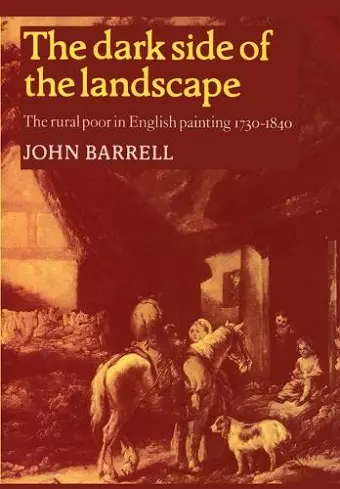The Dark Side of the Landscape
The Rural Poor in English Painting 1730–1840
Format:Paperback
Publisher:Cambridge University Press
Published:29th Sep '83
Currently unavailable, and unfortunately no date known when it will be back

John Barrell's 1980 study shows why the poor interested painters and how painters could represent them for the rich.
John Barrell's influential 1980 study shows why the poor began to be of such interest to painters, and examines the ways in which they could be represented so as to be an acceptable part of the décor of the salons of the rich. His terse and vigourous account has provided a landmark for literary critics, social and art historians.The eighteenth-century saw a radical change in the depiction of country life in English painting: feeling less constrained by the conventions of classical or theatrical pastoral, landscape painters attempted to offer a portrayal of what life was really like, or was thought to be like, in England; and this inevitably involved a distinct approach to the depiction of the rural poor. John Barrell's influential 1980 study shows why the poor began to be of such interest to painters, and examines the ways in which they could be represented so as to be an acceptable part of the décor of the salons of the rich. His discussion focuses on the work of three painters: Thomas Gainsborough, George Morland and John Constable. Throughout the book, Barrell draws illuminating comparisons with the literature of rural life and with the work of other painters. His terse and vigourous account has provided a landmark for social historians and literary critics, as well as historians of art.
'This is a most original, searching and disquieting book. It will help us to look at old masters with new eyes: and also, since we are convicted by Barrell of certain nostalgic illustions about the agrarian past, it will help us to look at ourselves.' E. P. Thompson
'A brilliant reading of certain sets of pictorial conventions (signs) and of how and why they changed during a given historical period.' New Society
'Barrell has made a valuable contribution to our knowledge of the interplay between art and ideology in the eighteenth century.' Art History
'This is a book which is both enjoyable to read and informative.' Agricultural History Review
'A valuable and pertinent book which art-historians of all political persuasions ought to read.' Notes and Queries
'An important book.' Burlington Magazine
ISBN: 9780521276559
Dimensions: 246mm x 173mm x 10mm
Weight: 410g
192 pages